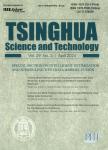Passive-Event-Assisted Approach for the Localizability of Large-Scale Randomly Deployed Wireless Sensor Network
Passive-Event-Assisted Approach for the Localizability of Large-Scale Randomly Deployed Wireless Sensor Network作者机构:Collegeof Information Science and Technology Agricultural University of Hebei Nanjing Telecommunication Technology Research Institute National University of Defense Technology Science and Technology on Information Systems Engineering Laboratory National University of Defense Technology
出 版 物:《Tsinghua Science and Technology》 (清华大学学报(自然科学版(英文版))
年 卷 期:2019年第24卷第2期
页 面:134-146页
核心收录:
基 金:partly supported by the National Natural Science Foundation for Outstanding Excellent Young Scholars of China (No. 61422214) the National Key Basic Research and Development (973) Program of China (No. 2014CB347800) the National Natural Science Foundation of China (No. 61371196)
主 题:network localizability random deployment Wireless Sensor Networks (WSNs) passive event
摘 要:Localizability in large-scale, randomly deployed Wireless Sensor Networks(WSNs) is a classic but challenging issue. To become localizable, WSNs normally require extensive adjustments or additional mobile nodes. To address this issue, we utilize occasional passive events to ease the burden of localization-oriented network adjustment. We prove the sufficient condition for node and network localizability and design corresponding algorithms to minimize the number of nodes for adjustment. The upper bound of the number of adjusted nodes is limited to the number of articulation nodes in a connected graph. The results of extensive simulations show that our approach greatly reduces the cost required for network adjustment and can thus provide better support for the localization of large-scale sparse networks than other approaches.



